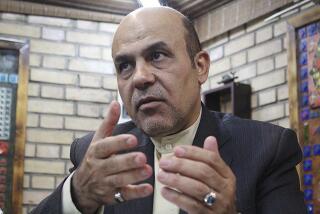Editorial: Iran’s U.N. envoy isn’t a threat
- Share via
The United States is irked that Iran has chosen as its representative to the United Nations a diplomat who apparently was involved with a student group that seized the U.S. Embassy in Tehran in 1979. The embassy takeover, a violation of international law that led to the 444-day captivity of 52 American hostages, contributed to hostility between the two countries that only recently has begun to abate.
But the Obama administration is making a mistake in publicly labeling as “not viable” the posting to the U.N. of Hamid Aboutalebi, an experienced diplomat aligned with Iran’s reformist President Hassan Rouhani. The ominous implication is that the State Department would deny Aboutalebi a visa necessary to enter this country.
Aboutalebi was 22 years old when he served as an interpreter for the students who had seized the embassy out of pent-up anger over long-standing U.S. support for the autocratic shah of Iran. It’s not unknown for youthful radicals to mature into middle-aged statesmen. As a young leftist in 1970s West Germany, Joschka Fischer took part in violent street demonstrations and was photographed attacking a policeman. Decades later, he served as foreign minister of a united Germany.
But even if the Aboutalebi of today were an unreconstructed anti-American, the U.S. would be wrong to try to prevent him from taking up a position at the U.N. Having agreed to serve as host country of the international organization, the U.S. shouldn’t interfere in decisions by member states about their representation in that body any more than it should block foreign leaders it objects to from addressing the U.N. (Palestine Liberation Organization leader Yasser Arafat, Cuban President Fidel Castro and Iranian President Mahmoud Ahmadinejad are among those who have spoken at the organization’s New York headquarters.)
Finally, the administration’s fixation on Aboutalebi may be unintentionally undermining efforts by several nations to induce Iran to abandon efforts to produce nuclear weapons. Some of the U.S. senators who approved a bill this week purporting to bar Aboutalebi from entering this country also support additional sanctions legislation that the administration believes would derail the current talks with Iran. The more the administration trumpets its opposition to Aboutalebi, the easier it will be for congressional critics to cite that grievance as a justification for new sanctions.
The administration has registered its displeasure with Aboutalebi’s appointment. Now it should refocus on more important matters, including the nuclear negotiations.
More to Read
Sign up for Essential California
The most important California stories and recommendations in your inbox every morning.
You may occasionally receive promotional content from the Los Angeles Times.













